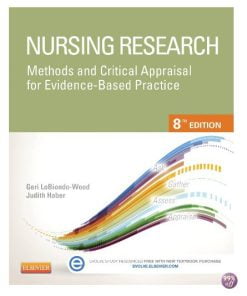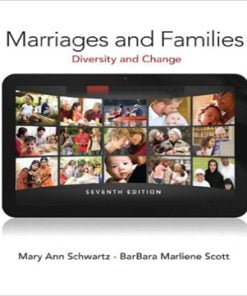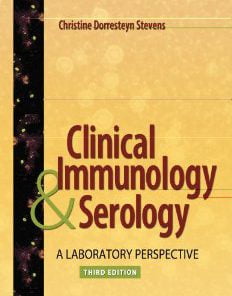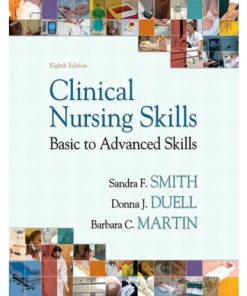Test Bank for Pharmacology A Patient-Centered Nursing Process Approach, 9th Edition, Linda McCuistion, Joyce Kee, Evelyn Hayes
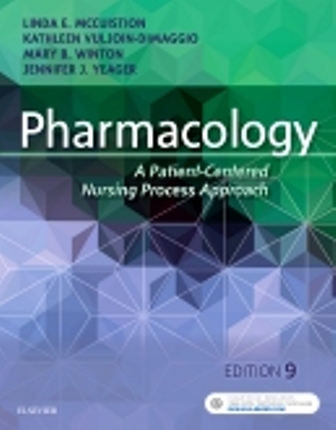
Product details:
- ISBN-10 : 1455751480
- ISBN-13 : 978-1455751488
- Author: Linda McCuistion, Joyce Kee, Evelyn Hayes
Prepare to administer drugs safely by mastering key pharmacology concepts and drug calculation skills! Pharmacology: A Patient-Centered Nursing Process Approach, 8th Edition covers nursing pharmacology within a real-world nursing context. Using a clear, streamlined approach, this text makes it easier to understand pharmacology with a detailed unit on dosage calculations, a nursing process framework for drug therapy, and summaries of prototype drugs. Written by nursing educators Joyce Kee, Evelyn Hayes, and Linda McCuistion, this edition includes a strong QSEN focus, enhanced coverage of prioritization, and more NCLEX® Examination–style questions on the subject of pharmacology.
Table of Contents
UNIT ONE: Introduction to Pharmacology
1. Drug Development and Ethical Considerations
2. Pharmacokinetics, Pharmacodynamics, and Pharmacogenetics
3. Cultural Considerations
4. Complementary and Alternative Therapies
5. Pediatric Considerations
6. Geriatric Considerations
7. Drugs in Substance Use Disorder
UNIT TWO: Pharmacotherapy and Drug Administration
8. The Nursing Process and Patient-Centered Care
9. Safety and Quality
10. Drug Administration
11. Drug Calculations
UNIT THREE: Maintenance of Homeostasis
12. Fluid Volume and Electrolytes
13. Vitamin and Mineral Replacement
14. Nutritional Support
UNIT FOUR: Autonomic Nervous System Drugs
15. Adrenergic Agonists and Antagonists
16. Cholinergic Agonists and Antagonists
UNIT FIVE: Central and Peripheral Nervous System Drugs
17. Stimulants
18. Depressants
19. Antiseizure Drugs
20. Drugs for Parkinsonism and Alzheimer’s Disease
21. Drugs for Neuromuscular Disorders and Muscle Spasms
UNIT SIX: Mental and Behavioral Health Drugs
22. Antipsychotics and Anxiolytics
23. Antidepressants and Mood Stabilizers
UNIT SEVEN: Pain and Inflammation Management Drugs
24. Antiinflammatories
25. Analgesics
UNIT EIGHT: Antimicrobial Drugs
26. Antibacterials
27. Antituberculars, Antifungals, and Antivirals
28. Peptides, Antimalarials, and Anthelmintics
UNIT NINE: Immunologic Drugs
29. HIV- and AIDS-Related Drugs
30. Transplant Drugs
31. Vaccines
UNIT TEN: Antineoplastics and Biologic Response Modifiers
32. Anticancer Drugs
33. Targeted Therapies to Treat Cancer
34. Biologic Response Modifiers
UNIT ELEVEN: Respiratory Drugs
35. Upper Respiratory Disorders
36. Lower Respiratory Disorders
UNIT TWELVE: Cardiovascular Drugs
37. Cardiac Glycosides, Antianginals, and Antidysrhythmics
38. Diuretics
39. Antihypertensives
40. Anticoagulants, Antiplatelets, and Thrombolytics
41. Antihyperlipidemics and Peripheral Vasodilators
UNIT THIRTEEN: Gastrointestinal Drugs
42. Gastrointestinal Tract Disorders
43. Antiulcer Drugs
UNIT FOURTEEN: Eye, Ear, and Skin Drugs
44. Eye and Ear Disorders
45. Dermatologic Disorders
UNIT FIFTEEN: Endocrine Drugs
46. Pituitary, Thyroid, Parathyroid, and Adrenal Disorders
47. Antidiabetics
UNIT SIXTEEN: Renal and Urologic Drugs
48. Urinary Disorders
UNIT SEVENTEEN: Reproductive and Gender-Related Drugs
49. Pregnancy and Preterm Labor
50. Labor, Delivery, and Postpartum
51. Neonatal and Newborn 52. Women’s Reproductive Health
53. Men’s Reproductive Health
54. Sexually Transmitted Infections
UNIT EIGHTEEN: Emergency Drugs
55. Adult and Pediatric Emergency Drugs
Related products
Test Bank
Test Bank for Clinical Immunology and Serology A Laboratory Perspective, 3rd Edition: Stevens
Test Bank
Test Bank for Essentials of Business Law and the Legal Environment, 11th Edition: Richard A. Mann




